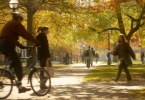By: Sadiyah Malcolm
The aim of higher education should not be to relay knowledge to students about the intricacies of the world, and the way in which it functions. Rather, the aim of higher education should be to equip students with the tools necessary to forge an idea of who they are in relation to the world at large and to develop the ability to assess what their contributions to society are, and should be. As stated by the prominent WEB Du Bois in The Education of Black People, “The University must become not simply a center of knowledge but a center of applied knowledge” (Du Bois, 126).
Only when we ground education in self-identity can the application thereof be feasible. Du Bois said it best: “No system of learning—no university—can be universal before it is German, French, Negro” (127). In considering education, we must be careful to recognize and accept the fact that there is no panoptic “American experience” across either race or culture or gender or religion. For this reason, it is undoubtedly imperative that institutions of higher learning exist to cater to these variances.
Like women’s institutions and religious institutions, historically black colleges and universities (HBCUs), for centuries, have existed to cater to the needs of a distinct group of people. Though the historical premise on which historically black institutions were built has changed, the purpose and relevance of HBCUs remain: to fulfill the educational needs of black people in the United States. They aimed to incorporate the black experience into the framework of higher education so as to encourage scholarly confidence and to provide educational opportunities to black people.
More importantly, HBCUS, while having admitted students of all races since their inception, have historically sought to encourage black Americans to assimilate into society, rather than to acculturate. Unfortunately, however, many students have, do, and will miss out on the opportunity to attend a historically black college or university due to the misapprehensions concerning HBCUs. Let us take a look at three of the most prevalent misconceptions of HBCUs, and contextualize them.
Misconception 1:”We live in a post-racial society; therefore HBCUs are no longer relevant.”
To begin, I urge you to recall that 50 years has not yet passed since the assassination of the renowned civil rights activist, Reverend Martin Luther King Jr. Furthermore, on August 19th, 2014, Michael Brown, an eighteen-year-old black teen was shot dead by a white police officer in Ferguson, Missouri, fourteen days prior to the start of his college career.
While most of America was forced to grapple with the question of whether or not the murder of this young black male was influenced by racial motifs, Howard University students and Morehouse College professors were among the first to publically respond to the ordeal. At such institutions, students are often encouraged to engage in open discussion concerning social happenings and are urged to propose practical solutions to social injustices. At such institutions, students are not told that we live in a “post-racial” America; rather they are asked, “What has been your experience growing up in America, and what does that say about the society we live in today?”
Students explore the various answers to these questions across a plethora of disciplines, activities, venues and studies. And they value the answers they discover, no matter what they may be. These conversations foster a sense of awareness, pride, and confidence amongst scholars, professionals, and communities. And as a result, these institutions produce students that enter the adult world with an understanding of who they are. They are confident about their place in society and are eager to influence the world positively through their respective disciplines.
Incidences such as the murder of Michael Brown force America to look in the mirror and assess itself for what it is, at present, and not as it is idealistically. These incidences serve as proof that in 2014, with a black Chief of State, the reality is that people of African descent still suffer a sort of social ostracism that has yet to be appeased.
While we do not live in a post-racial society, evidently, we can learn a lesson in transparency from historically black institutions. By doing so, it is perfectly viable that America may be taking a step in the direction of ameliorating a measure of the social ills that plague its land.
Misconception 2: HBCUS are “party schools.”
A party school is defined, as “a college, university, or any institution of higher learning in which there exists a culture of ribaldry and licentiousness amongst the student population”(YourDictionary.com).
When a student enters college, they are usually 17-19 years old, having just reached the age of independence. At that age, students are at a pivotal point of self-awareness. For most, their yearnings for social acceptance are at an unusual high, and quite frankly, so are their hormones. In addition, for many adolescents, the college years are their first years away from their parents’ homes, and more importantly, their parents’ rules.
For the first time, young men and women are cohabitating in an environment that only places minimal rules on their interactions. Therefore, many view the college years as an opportunity to express those feelings of freedom among others that share that experience. We cannot, then, contain this experience to the HBCU population; it is an experience shared by young adolescents nationwide.
From Harvard to Howard to Hampton to Harcum, all colleges and universities have a student body that is eager to experience the world without the restraints of adult regulations. There are parties, alcohol, drugs and sex on every campus. In essence, then, are all schools party schools?
Now let us, for a moment explore the possibility that HBCUs are “party schools.” Then might I ask, is that classification necessarily a con? If HBCUs are party schools, as such, is there not a possibility that these institutions are also teaching their students valuable life skills? If this assumption is indeed true, then the students that attend these institutions are being socialized to develop responsibility, decision-making skills, and balance.
When students desire to go out with friends, but they have assignments due the next morning, must they not employ the skills necessary to prioritize and balance work and play? When students are faced with the peer pressure to party and to engage in drinking and doing drugs, must they not employ, or develop the skill of self-discipline in their decision-making? With that, let us disabuse ourselves of the notion that HBCUs are “party schools.”
Misconception #3: “All-Black” schools are not diverse, and thus they create an artificial environment for students.”
Initially, concerning HBCUs let us begin by dissembling the epithet: “All-Black.” HBCUs are not now, nor have they ever historically been exclusive to black students. Historically black institutions have educated a gamut of races, and at present, many non-black students are matriculating at HBCUs. According to the National Center for Education Statistics, in 2011, non-black students comprised 19% of the HBCU student population (web).
Moreover, predominantly white institutions, like historically black institutions, have student bodies among which, a “majority” group exists. For the former, white students constitute more than half of the population, and for the latter, black students represent the majority. With that established, is the question of whether or not HBCUs are “diverse” still worth addressing?
If it is, we must, next, debunk the myth that “diversity” is based on appearance. Within majority black populations, there exist, people of different genders, social classes, religions, nationalities, sexual orientations, and walks of life. In fact, I would argue, Black people are the most diverse group on the face of the earth. Concerning diversity, blackness encompasses a full range of complexion, culture, creed, class and culture. Annually, a range of students comes from the four corners of the earth to matriculate at HBCUs; HBCUs are not lacking in the area of diversity.
Lastly, while some people like to believe that the HBCU experience shelters students, or sets them up for a world that doesn’t exist, let us remember that global connections are becoming not only more prevalent but also more critical. While considering this, let us also consider that the majority of the world is non-white. On that account, HBCUs do not create an artificial environment for their students.
Since their inception, historically black colleges and universities have been criticized about their existence. Additionally, I argue that this age-old debate of whether or not HBCUs are still relevant will remain a point of conversation for some time to come. Nonetheless, let us no longer fool ourselves into believing that the America we live in is post-racial. Let us no longer buy into the label of a “party school,” and let us rid ourselves of the false definition of diversity as being contingent upon physical appearance.
To conclude, the focus of higher education, again, should not solely be to feed students knowledge of the world, and how it functions; but to challenge and to equip one with the necessary mental tools to assess themselves, the world they live in, and the impact they already have, and seek to have on the world at large. Only from that vantage point will the application of knowledge be possible, worthwhile and effective.










buy viagra
WALCOME
This is a nice post from your website. This post gives quality info. I’m certainly going to look into it. Very valuable tips are given here. These tips may help readers to make new idea on their own writing works. Anything we taken info from the blogs we have to implement that in for all objectives and purposes then only we can know that correct thing clearly.
Yes, the main focus of the higher education is build communities. I think most of the students just to get the jobs on law assignment help you can find that most of the students does not seek the training of treating world but just to get jobs.
how many carbs per day on keto diet https://ketodietplanus.com/
best gay black dating sites https://freegaychatnew.com/
all gay dating sites ever https://gaychatus.com/
squirt gay dating review https://gaychatrooms.org/
gay cigarette dating https://gaychatgay.com/
danger gay dating site https://gaydatingzz.com/
best gay bear dating sites https://gaydatingcanada.com/
rich gay dating site https://gayedating.com/
gay dating questions https://gaydatinglosangeles.com/
manhunt com gay dating https://dating-gaym.com/
best asian gay dating site https://gay-singles-dating.com/
write good essays https://essaywritercentral.com/
writing essays help https://essayghostwriter.com/
writing an essay online https://essaypoints.com/
write an argument essay https://essaysnet.com/
write my essay.com https://essaytag.com/
essays on writing https://onlinecasinos4me.com/
cheap custom essay writing services https://online2casino.com/
best casinos online https://casinoonlinet.com/
online american casinos https://casinoonlinek.com/
online casino bonuses https://casinosonlinex.com/
top usa online casinos https://onlinecasinoad.com/
write and essay https://buy1essay.com/
writing experience essay https://multiessay.com/
writing a argumentative essay https://student-essay.com/
essays to write https://dollaressays.com/
princess sex games https://cybersexgames.net/
sex games for free https://winsexgames.com/
download sex games https://sexygamess.com/
reality sex games https://sex4games.com/
1lesbians
dad dating simulator gay uncensored https://gaypridee.com
dating hung gay macho https://gay-buddies.com
gay dating sights https://gayprideusa.com
free gay men dating sites missouri https://speedgaydate.com
1legally
pittsburgh gay chat https://bjsgaychatroom.info/
gay male chat https://gaytgpost.com/
gay universe chat https://gay-buddies.com/
seven fortune slots https://2-free-slots.com/
oceans of beauty slots https://freeonlneslotmachine.com/
big fish free slots games https://candylandslotmachine.com/
penny slots free https://slotmachinesworld.com/
play sizzling 7 slots free https://beat-slot-machines.com/
card game slots https://download-slot-machines.com/
dgn free slots https://411slotmachine.com/
best online slots https://www-slotmachines.com/